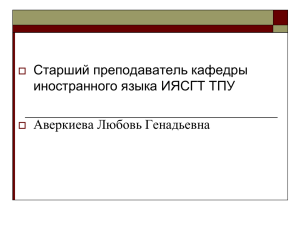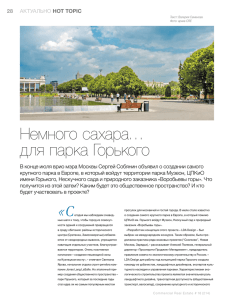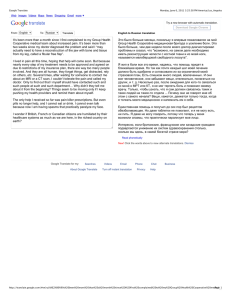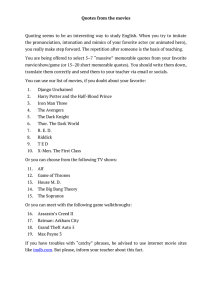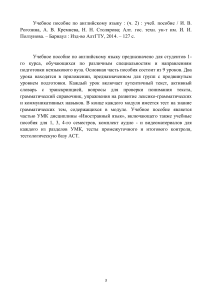Lesson 5
реклама
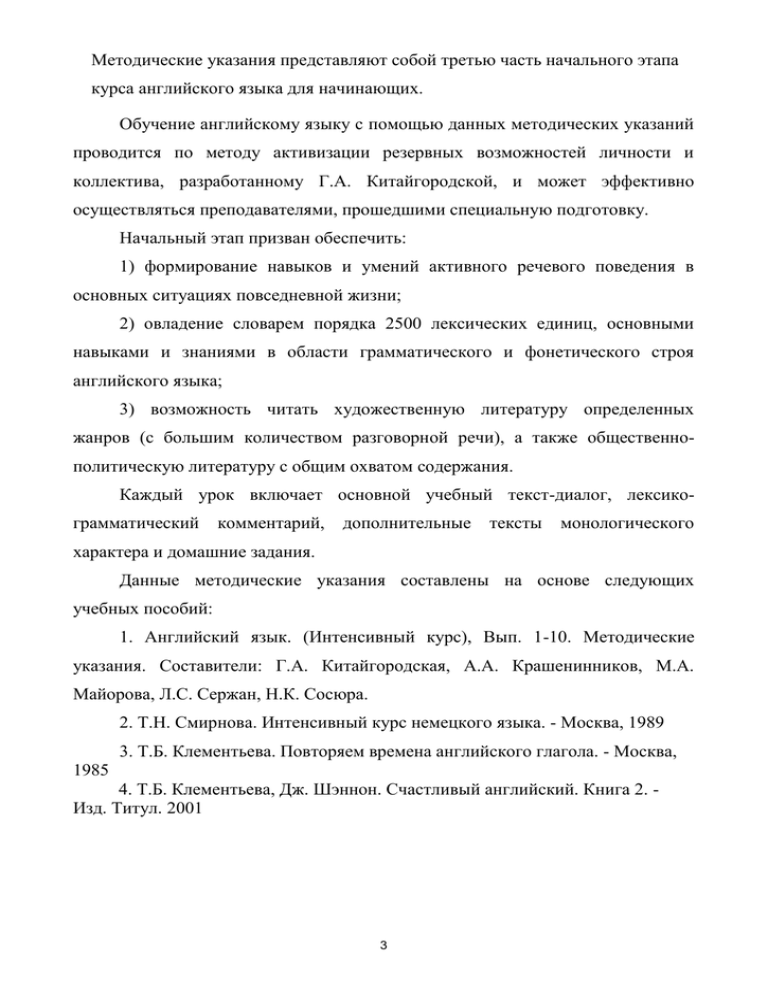
Методические указания представляют собой третью часть начального этапа курса английского языка для начинающих. Обучение английскому языку с помощью данных методических указаний проводится по методу активизации резервных возможностей личности и коллектива, разработанному Г.А. Китайгородской, и может эффективно осуществляться преподавателями, прошедшими специальную подготовку. Начальный этап призван обеспечить: 1) формирование навыков и умений активного речевого поведения в основных ситуациях повседневной жизни; 2) овладение словарем порядка 2500 лексических единиц, основными навыками и знаниями в области грамматического и фонетического строя английского языка; 3) возможность читать художественную литературу определенных жанров (с большим количеством разговорной речи), а также общественнополитическую литературу с общим охватом содержания. Каждый урок включает основной учебный текст-диалог, лексикограмматический комментарий, дополнительные тексты монологического характера и домашние задания. Данные методические указания составлены на основе следующих учебных пособий: 1. Английский язык. (Интенсивный курс), Вып. 1-10. Методические указания. Составители: Г.А. Китайгородская, А.А. Крашенинников, М.А. Майорова, Л.С. Сержан, Н.К. Сосюра. 2. Т.Н. Смирнова. Интенсивный курс немецкого языка. - Москва, 1989 3. Т.Б. Клементьева. Повторяем времена английского глагола. - Москва, 1985 4. Т.Б. Клементьева, Дж. Шэннон. Счастливый английский. Книга 2. Изд. Титул. 2001 3 Lesson 5 (the fifth lesson) Урок 5 (пятый урок) Have you got a spare ticket? У Вас нет лишнего билетика? T: We're going to the theatre tonight. Сегодня вечером мы идем в театр. L: It's too good to be true. Даже не верится. I've always wanted Мне всегда хотелось to see a theatre performance. посмотреть спектакль. Должна сознаться, я почти потеряла D: I must admit I have almost lost всякую надежду попасть туда. all hope of getting there. T: I'm sorry to disappoint you: Жаль вас разочаровывать: we're going to different theatres. мы идем в разные театры. L: How sad! Как это грустно! T: I've booked seats for an opera, Я заказала билеты в оперу, a ballet and a musical. балет и музыкальную комедию. A: Who likes musicals? Кто любит музыкальную комедию? T: Tastes differ. Admit it. О вкусах не спорят. Признайте это. You can go to the puppet show, Можете пойти в кукольный театр, the circus and a recital. в цирк и на сольный концерт. A: What about a play? А как насчет драмы? T: I didn't look at the poster Я не посмотрела афишу for plays драмтеатров, because it's difficult to follow plays потому что трудно понимать пьесы in a foreign language. на иностранном языке. A: Who is interested in seeing a play? Кому интересно смотреть пьесу? Мне хотелось бы увидеть I'd like to see some famous Russian actors. знаменитых русских актеров. Of course, you could come along Конечно, Вы могли бы пойти с нами and interpret for us. и переводить нам. T: And disturb everybody. И всем мешать. That reminds me of a story. Это напоминает мне одну историю. 4 A man went to the opera one day. Один человек пошел в оперу. "The Barber of Seville" was on. Шел "Севильский цирюльник". He was looking forward to it very much. Он с нетерпением ждал этого. But ... there's always a But. Но... всегда есть НО. Two elderly ladies Две пожилые дамы were sitting just in front of him. сидели прямо перед ним. The curtain rose. Занавес поднялся. Immediately they began whispering. Сразу же они начали шептаться. They were clearly enjoying their chat. Им явно нравился их разговор. The man was terribly annoyed. Мужчину это сильно раздражало. He took his time Он выждал время, before he decided to speak to them. прежде чем решил поговорить с ними. "Excuse me", he said, "Извините меня",- сказал он, "but I can't hear anything". "но я ничего не слышу". They turned round quickly. Они быстро обернулись: "Be quiet. Mind your own business. "Успокойтесь. Это Вас не касается. It's a private talk". Это наш личный разговор". They looked so angry У них был такой рассерженный вид, that it was the man что именно он who was embarrassed. почувствовал себя смущенным. L: Which is the best theatre here? Какой театр здесь самый лучший? T: Um... hard to say... Трудно сказать ... A friend of mine often goes Один из моих друзей часто ходит в маленький театрик. to a small theatre. A: What does he like about it? Что ему там нравится? The company? The season's programme? Труппа? Репертуар? T: I'm afraid he likes it Боюсь, он ему нравится because of the cosy bar из-за уютного бара, where they serve beer. где подают пиво. D: What would you say А что Вы можете сказать 5 about the Bolshoi? Was it difficult о Большом театре? Трудно было to get enough seats for the Bolshoi? достать билеты на всех в Большой? T: It was impossible. Невозможно. I had to use my connections Мне пришлось использовать связи, привлечь знакомых, and pull a few strings, and almost in vain. и почти бесполезно. D: Is the Bolshoi that popular? А что, Большой так популярен? T: Yes, extremely popular. Да, чрезвычайно популярен. The seats are not expensive. Билеты там недорогие. Anyone can afford them, Любой в состоянии купить их, even students and pensioners. даже студенты и пенсионеры. A: No wonder there're crowds of people Не удивительно, что повсюду толпы asking for spare tickets спрашивающих лишний билетик, особенно в день премьеры. especially on the first night. D: Where are our seats, I wonder? Интересно, где у нас места? T: In the stalls, in the circle, in a box and В партере, в ярусе, в ложе in the back row of the balcony. и на последнем ряду балкона. L: Up in the gods? That's no good for me. На галерке? Это не для меня. You see, I'm short-sighted. Видите ли, я близорука. T: You can borrow opera glasses Вы можете взять бинокль from the cloak-room. в гардеробе. L: Who is singing at the opera tonight? Кто сегодня поет в опере? Are we going to see any stars? Увидим ли мы звезд? T: I'm not sure of the cast... Я не совсем уверена в составе. It'll be a surprise. Это будет сюрпризом. A: Speaking of surprises... Кстати о сюрпризах... I heard a story the other day. На днях я слышал историю. A man was given a ticket Одному человеку вручили билет at the last moment. в последний момент. He was late for the beginning. Он опоздал к началу. 6 He was told in the foyer В фойе ему сказали, that the performance had been changed. что спектакль заменили. But the ticket were still valid. Но билеты действительны. He asked what was on. Он спросил, что идет. "Spartacus", was the brief answer. "Спартак", ответили кратко. How exciting! Unbelievable! Восхитительно! Невероятно! Who is the goal-keeper? The forward? Кто вратарь? Кто нападающий? Полузащитники? Судья? The half-backs? The referee? What team are they playing against? Против какой команды они играют? I hope they'll win Я надеюсь, они выиграют or at least draw. или по крайней мере, сведут в ничью. I wouldn't like to see them lose. Я бы не хотел видеть, как они проигрывают. D: I can imagine how upset he was Могу представить, как он расстроился, to find out. когда узнал. T: Far from it. He was impressed Напротив. На него произвели by the music, the scenery, впечатления музыка, декорации, the dancing, the costumes, танцы, костюмы, the orchestra and the conductor. оркестр и дирижер. P: How much are the tickets? Сколько стоят билеты? Do we owe you something? Мы Вам что-нибудь должны? T: On the contrary. I have some change Напротив. У меня осталась мелочь, to give back. которую нужно отдать. L: I have an idea. У меня идея. Let's go up to my room afterwards Давайте потом поднимемся ко мне and chat about the performances. и поговорим о представлениях. I'll join you after the concert Я присоединюсь к вам после концерта of medieval music. средневековой музыки. 7 NOTES - КОММЕНТАРИИ Времена, соответствующие русскому будущему FUTURE Indefinite Continuous Perfect Perfect Continuous Завершенно- Простое Длительное Завершенное длительное Констатация Процесс Завершенность факта в определённый к определенному момент в будущем моменту в будущем Процесс в течение некоторого периода времени до определенного момента в будущем Он напишет Он будет писать Он напишет письмо это письмо письмо завтра, завтра. когда я приду. He will write He will be writing this letter this letter when I tomorrow. come. will V He will have written the He will have been writing for 2 hours letter before I come. when I come. will be V-ing I, he I, he she, it she, it we, до того, как я приду. will V we, you. you. they they will have V3 I, he will be V-ing Он будет писать завтра уже 2 часа, когда я приду she, it we, you. V-ing I, he will have V3 they Will # V? Will # be V-ing? Will # have V3? # won’t V # won’t be V-ing # won’t have V3 8 will have been she, it we, you. will have been V-ing they Will # have been V-ing # won’t have been V-ing 1. Для выражения действия, которое совершится или будет совершаться в будущем, глагол в английском языке употребляется в одной из форм будущего времени: Future Indefinite, Future Continuous, Future Perfect и Future Perfect Continuous. Future Indefinite употребляется для выражения однократного или повторяющегося обычного действия или ряда последовательных действий в будущем. Например: During your stay we’ll visit offices, museums... Типичные обстоятельства времени: tomorrow, next week, in a week и т.д. Future Continuous употребляется: а) для выражения процесса, который будет происходить в определенный момент в будущем. Этот момент может быть выражен обстоятельством времени: at five o`clock tomorrow, at this time, at midnight, или каким-то одномоментным действием: When you come, he will be doing homework. At midnight he will be sleeping. б) для выражения процесса, который будет происходить в определенный период времени в будущем, который может быть обозначен только следующим образом: I’ll be reading the whole day tomorrow. Don’t phone him between seven and ten tonight. He will be reading for his exam. в) В современном английском языке Future Continuous часто используется для выражения действия в будущем, которое обязательно произойдет. Future Perfect употребляется для выражения будущего действия, которое закончится до определенного момента в будущем. Этот момент может быть выражен обстоятельством времени или другим будущим действием, выраженным Present Indefinite в придаточном предложении времени с такими союзами, как before, when, by the time. When we meet again, I’ll have translated the article. In another two years you will have left school. 9 Future Perfect Continuous употребляется для выражения процесса в будущем, который начнется раньше определенного момента в будущем и будет продолжаться какой-то период времени до этого момента. Момент этот может быть выражен обстоятельством времени или другим будущим действием, выраженным Present Indefinite в придаточном предложении времени. We’ll have been working at this problem for a month when you come next time. С глаголами, которые выражают длительное действие ( например: live, work, study, teach, travel ) вместо Perfect Continuous употребляется Perfect He has lived here since 1989. В придаточных предложениях времени и условия будущие времена не употребляются, а вместо них употребляются соответствующие настоящие ( т.е. вместо Future Indefinite - Present Indefinite, вместо Future Continuous - Present Continuous и т.д.). Союзы придаточного времени: when, as, as soon as, while, till, until, before, after. . We`ll support them till they find work. As soon as we get tickets, we`ll send them to you. I`ll do it when I have finished writing this letter. Союзы придаточного условия: if, unless, provided ( that ), providing, as long as. If I marry Jane, we will need the money. If he has done the windows, he will want his money. You will fail your exams unless you work harder. If he has done the windows, he will want his money. Exercises Exercise1. Translate the following sentences into English. 1. Пожалуйста, дайте мне ваш номер телефона – мамочка будет беспокоиться, если я не скажу ей адрес церкви. 2. Скоро вся эта история закончится, но как? 3. В полдень господин с бородой будет прогуливаться по площади перед вокзалом, и ждать своего португальского гостя, держа в руке зонт. 10 4. Я уверен, мне будет не хватать моей личной яхты и белого особняка, когда я буду далеко отсюда. 5. Боюсь, что Джон будет подозревать свою скромную жену в том, что ей нравится другой джентльмен. 6. Рада сообщить вам, что эта пара поженится в субботу. 7. После тяжелого дня усталый рабочий примет теплый душ, чтобы расслабиться. 8. Польская республика будет представлять свою политическую программу по телевиденью во вторник. 9. Завтра в пять часов я буду слушать пленку в лаборатории. Exercise2. Listen to the following dialogues. Learn them by heart. At the Theatre Dialogue 1 Dialogue 2 Dialogue 3 Dialogue 4 A: I'd like to book A: Are there any A: Can I still get A: Is it still two seats for seats left for tickets for tonight's possible to get tomorrow. Saturday night? show? tickets for tonight? B: Would you like B: A-11 and B-I4 B: The front row B: You can sit something in the are all that's left. of the dress circle wherever you like is fairly free. in the first row. front stalls? A: I suppose A: Haven't you got A: Are there any A: Isn't there there's nothing anything cheaper? anything a little boxes? further back, is less dear? there? B: Not unless you B: Only if B: No, I'm afraid come to the somebody cancels. that's all there is. matinee. B: No, I'm afraid you've left it rather late. 11 Reading For some reason or other the house was crowded that night. The orchestra was quite dreadful, but it lasted a few minutes; then the curtain rose, and Sybil Vane stepped on to the stage. Yes, she was certainly lovely to look at. She stepped back a few paces, and her lips seemed to tremble. The scene was the hall of Capulet’s house, and Romeo in his pilgrim's dress had entered with Mercutio and his other friends. The " band struck up a few bars of music, and the dance began! Yet she was curiously listless. She showed no sign of joy when her eyes rested on Romeo. The few words she had to speak were spoken in thoroughly artificial manner. It made the passion unreal. Dorian Gray grew pale as he watched her. He was puzzled and anxious. Neither of his friends dared to say anything to him. She seemed to them to be absolutely incompetent. They were horribly disappointed. Yet they felt that the true test of any Juliet is the balcony scene of the second act. They waited for that. If she failed there was nothing in her. She looked charming as she came out in the moonlight. That would not be denied. But her acting was unbearable, and grew worse as she went on. Her gestures became artificial. She overemphasized everything that she had to say. It was simply bad art. She was a complete failure. Even the common, uneducated audience of the pit and gallery lost their interest in the play. They got restless and began to talk loudly and to whistle. The only person unmoved was the girl herself. When the second act was over there came a storm of hisses and Lord Henry got up from his chair and put on his coat. "She is quite beautiful, Dorian," he said, “but she can't act, let us go." "I am going to see the play through," answered the lad, in hard, bitter voice, "I am awfully sorry that I have made you waste an evening, Harry, 1 apologize to you both." (from The Picture of Dorian Gray by O. Wilde) to tremble - дрожать puzzled – озадаченный anxious – обеспокоенный to deny – отрицать 12 unbearable – невыносимый artificial – искусственный VOCABULARY Types of curtain operation Cloakroom hall (Am. checkroom hall) draw curtain (side parting) cloakroom (Am. checkroom) tableau curtain (bunching up sideways) cloakroom attendant (Am. checkroom fly curtain (vertical ascent) attendant) combined fly and draw curtain cloakroom ticket (Am. check) foyer (lobby, crush room) playgoer (theatregoer. Am. theatergoer) usher; form: box attendant opera glass (opera glasses) programme (Am. program) commissionaire Auditorium and stage Rehearsal (stage rehearsal) stage chorus proscenium singer auditorium singer gallery (balcony) orchestra pit upper circle orchestra dress circle (Am. balcony, mezzanine) conductor front stalls baton (conductor's baton) seat Paint room Dressing room stagehand (scene shifter) dressing room mirror catwalk (bridge) make-up gown set piece make-up table reinforcing struts greasepaint stick built piece (built unit) chief make-up artist (chief make-up backcloth (backdrop) man) 13 portable box for paint containers make-up artist (hairstylist) scene painter wig paint trolley props(properties) stage designer (set designer) theatrical costume costume designer call light design for a costume sketch for a costume model stage model of the set Stagehouse with machinery prompt box (machinery in the flies and below prompter stage) stage manager's desk control room stage director (stage manager) control console (lighting console, revolving stage lighting control console) with preset trap opening control for presetting lighting effects lift (Am. elevator) lighting plot (light plot) bridge (Am. elevator), a rostrum grid (gridiron) pieces of scenery fly floor (fly gallery) scene sprinkler system for fire prevention actor (for fire protection) actress fly man 3extras (supers, supernumeraries) fly lines (lines) 4director (producer) cyclorama 4prompt book (prompt script) backcloth (backdrop, background) 4director's table (producer's table) arch, a drop cloth 4assistant director (assistant producer) border 4director's script (producer's script) compartment (compartment-type, 4stage carpenter compartmentalized) batten (Am. border 4stagehand (scene shifter) light) 4set piece 14 stage lighting units (stage lights) 4mirror spot (mirror spotlight) horizon lights (backdrop lights) 4automatic filter change (with colour adjustable acting area lights (acting area filters, colour mediums, gelatines) spotlights) 5hydraulic plant room scenery projectors (projectors) 5water tank monitor (water cannon) (a piece of 5suction pipe safety equipment) 5hydraulic pump travelling lighting bridge (travelling 5pressure pipe lighting gallery) 5pressure tank (accumulator) lighting operator (lighting man) 5pressure gauge portal spotlight (tower spotlight) 5level indicator (liquid level indicator) adjustable proscenium 5control lever curtain (theatrical curtain) 5operator iron curtain (safety curtain, fire curtain) rams forestage (apron) footlight (footlights, floats) 15
